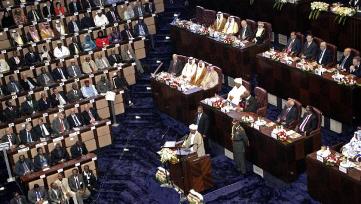Sudanese president replaces defence, oil and foreign ministers in cabinet reshuffle
June 7, 2015 (KHARTOUM) – The Sudanese president Omer Hassan al-Bashir issued decrees on Saturday night naming ministers in his new cabinet formed after the official commencement of his new term this week.

The former agriculture minister Ibrahim Mahmoud Hamid was also appointed as a new presidential assistant.
Musa Mohamed Ahmed, Jalal Youssef al-Digair and Abdul Rahman al-Sadiq al-Mahdi were retained as presidential assistants.
Ibrahim Ghandour, who was Bashir’s assistant, was tapped to replace Ali Karti as the foreign minister.
The longtime defence minister Abdel-Rahim Mohamed Hussein was given the governorate of Khartoum and was replaced by Lieutenant General Mustafa Obeid as “acting” defence minister.
Hussein is one of four government figures wanted by the International Criminal Court (ICC).
Mohamed Zayed assumed the oil portfolio from his predecessor Awad Makkawi.
Finance Minister Badr al-Din Mahmoud and Interior Minister Esmat Abdul-Rahman remained in their posts.
For states, Bashir appointed Ali Hamid as governor of the Red Sea, Mohammed Tahir Eila as governor of Gezira, Abdul-Hamid Musa Kasha as governor of White Nile, Mirghani Saleh as governor of Gedaref, Adam Gima’a as governor of Kassala, Hussein Yassin as governor of Blue Nile, Mohammed Hamid al-Ballah as governor of Nile River, Ali al-Awad as governor for the Northern state and Ahmad Haroun as governor of North Kordofan.
Essa Adam Abakar was named as South Kordofan governor, Abu al-Qasim al-Amin for West Kordofan, Abdel-Wahid Youssef for North Darfur, Adam al-Faki for South Darfur, Khalil Abdallah for West Darfur, Ja’afar Abdul-Hakam for central Darfur and Anas Omar for Eastern Darfur.
The appointment of governors was deliberately designed to keep governors out of their hometowns while the former governor of North Darfur Osman Kibir has lost his post which he has held for many years.
The leader of the Mahameed clan and notorious Janjaweed leader Musa Hilal has been fiercely demanding the removal of Kibir after accusing him of fomenting discord between tribes.
The ruling National Congress Party (NCP) has easily won the general elections held last April that were boycotted by major opposition parties and saw a very low voter turnout.
However it allocated around 30% of the cabinet posts to other parties which contested in the elections such as the DUP which had said previously that it will not join the government to protest the low representation.
The new government does not imply any radical change in foreign or economic policies for the next period.
In his swearing-in ceremony, Bashir vowed to pursue dialogue with the West to normalize relations and announced that the national dialogue process would kick off soon.
He also pledged to fight corruption and nepotism while announcing that around 8,000 tons of gold reserves have been identified in the country worth $330 billion.
(ST)
